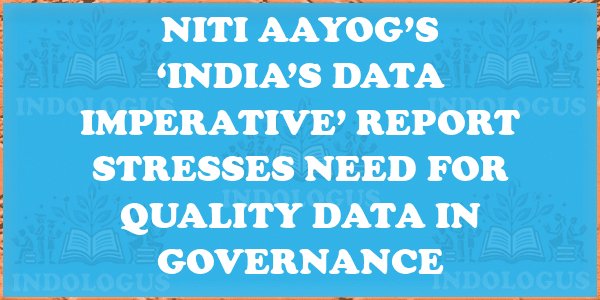In a recent development aimed at enhancing India’s digital governance framework, NITI Aayog unveiled its latest Future Front report titled “India’s Data Imperative: The Pivot Towards Quality” in New Delhi. This quarterly insights series publication highlights the crucial requirement for high-quality data to bolster public trust, enable informed policymaking, and ensure efficient service delivery.
Why is this Important for Competitive Exams?
On June 26, 2025, NITI Aayog issued the third edition of its Future Front report, focusing on the significant data quality challenges facing India. This release aligns with the increasing centrality of digital governance in public services and decision-making processes, underscoring the heightened significance of accurate, timely, and standardized data.
Core Objectives of the Report
- Elevate awareness about the challenges posed by poor data quality in public systems.
- Present actionable solutions and tools to enhance data integrity.
- Reinforce the connection between data quality, citizen trust, and effective governance.
Key Themes Explored in the Report
- Data Gaps & Fragmentation: Discusses the drawbacks of siloed and outdated datasets.
- Public Service Impact: Illustrates how inconsistent data impedes service delivery and policy formulation.
- Call for Data Culture: Urges organizations to view data as a public asset and adopt a “data-first” approach.
- Toolkit for Practitioners: Introduces user-friendly digital tools for real-time data validation and analysis.
Voices at the Report Launch
- B.V.R. Subrahmanyam (CEO, NITI Aayog): Advocated for systemic changes in data collection and management by the government.
- Dr. Saurabh Garg (Secretary, MoSPI): Emphasized the importance of interoperability and standardization.
- Debjani Ghosh (Distinguished Fellow, NITI Aayog): Stressed the use of technology to enhance data reliability across various sectors.
Broader Impact of the Report
- Expected to guide ministries, states, and local administrations in crafting data-centric policies.
- Anticipated to bolster initiatives like Digital India and international comparisons such as Data for Development.
Key Takeaways for Competitive Exams
- Understanding the significance of quality data in governance is crucial for effective policymaking.
- Awareness of data gaps and the need for a data-centric culture are essential for public trust.
- Utilizing digital tools for data validation and analysis can enhance service delivery and policy outcomes.
- Interoperability, standardization, and leveraging technology play vital roles in improving data credibility.
- Data-driven policy design is pivotal for the success of national initiatives like Digital India.



